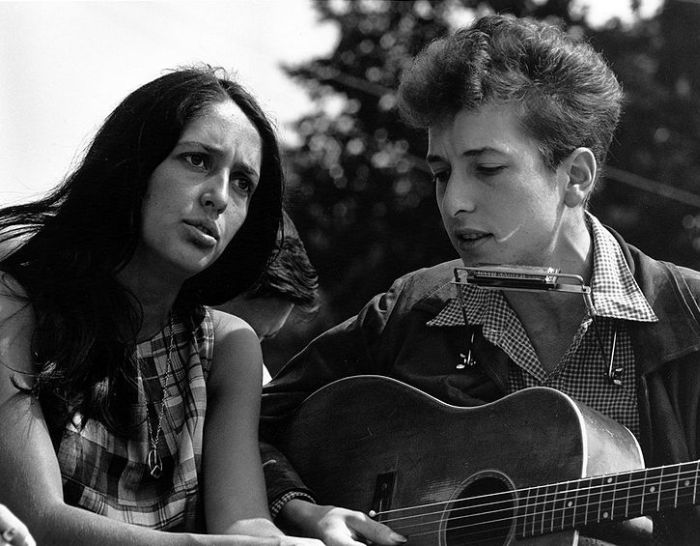

Heading straight for a fall" Considering the song was written in 1975, it is my reading of it, that Bob rang her up one day looking for sympathy when he realised his marriage to Sara Lownds was on the rocks. "hearing a voice I'd known a couple of light years ago I put these lyrics in my top ten because of the raw sadness and pain that they are able to drudge up but also because it's that raw truth that comes through and her strength to say no to being in that position again. And given that he thought her poetry was lousy I think she more than makes up for it with these lyrics. She brought diamonds to the relationship and all she got from him was rust. He just wasn't capable of returning the favor and she got nada from him for emotional support when it came to her life and hard times. But it wasn't an adult to adult relationship emotionally. It's obvious she cared for him during this time as a mother would for a wounded child.

Joan clearly is saying that she was there for him emotionally during a period in his life when he was "temporarily lost at sea" meaning a vulnerable scary place, maybe even going through an identity crisis, which isn't unusual with such successful artists and with as much fame as Dylan. People people, it's just not that complicated! The title simply is stating from Joan's point of view the inequity of the relationship. “To Bobby” never made an appearance in the show.And if you're offering me diamonds and rust Dylan didn’t write any new protest songs, but at least she got to sing the old ones with him one last time. Later that year, Dylan asked Baez to join him on his Rolling Thunder Revue tour. Radio did play that one, and it gave her career a much-needed boost. Three years later she wrote “Diamonds and Rust,” a significantly better song that focused on their personal relationship and her hurt feelings over how it all ended. The song called out to me from the radio like a public service announcement.” The song was hardly a hit, and it’s hard to imagine what radio station Dylan was listening to that played “To Bobby,” but there’s no doubt that it annoyed him. “Joan Baez recorded a protest song about me that was getting big play,” he wrote in his 2004 memoir Chronicles, “challenging me to get with it – come out and take charge, lead the masses – be an advocate, lead the crusade. Needless to say, Dylan didn’t appreciate the unsolicited advice. Trump Judge Restricts Biden Officials From Working With Social Media to Combat Misinformation “You left us marching on the road and said how heavy was the load,” she sang, “The years were young, the struggle barely had its star/ Do you hear the voices in the night, Bobby?/They’re crying for you /See the children in the morning light/ Bobby they’re dying.” Joan Baez was so desperate to see her former singing partner get back into the political sphere that she addressed him directly by song on “To Bobby” from her 1972 LP Come from the Shadows. The fact he moved away from topical songs in 1964 and had never uttered a single word against the war didn’t seem to matter much to them. The Vietnam War was winding down by this point, but the protest movement was still going strong and they longed for a leader of Dylan’s stature. II and the “George Jackson” single the following year. There hadn’t been a new studio album since 1970’s New Morning, giving his fans little more to chew on a handful of fresh tracks for Bob Dylan’s Greatest Hits Vol. By the fall of 1972 Bob Dylan had been living largely outside of the public eye for six very long years.


 0 kommentar(er)
0 kommentar(er)
